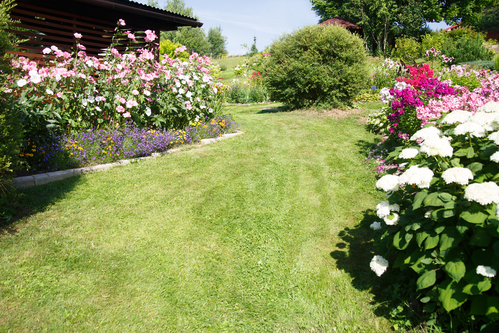There is no perfect garden design for all properties. Therefore, if you are interested in improving your landscape by establishing a garden, you must create a custom design that matches your needs. We at DK Landscaping know that an ideal design should complement the unique aspects of your property. Each piece of land has idiosyncrasies which can be used in landscaping. In addition, you must think about your goals for your new garden. Here are some simple guidelines to help you get started.
Choose Your Plants Wisely

The best garden begins with the selection of the right plants to complement your landscape design and practical needs. In general, the first issue that you should consider when choosing your flora is the purpose of the garden. This space can be used to grow ornamental plants for aesthetic appeal. Alternatively, you can choose to grow edibles such as herbs and vegetables. If you are interested in both edibles and visual impact, it is possible to combine both types of plants.
The climate and environment is also an important consideration during the selection of plants for your garden. If you choose flowers, herbs or vegetables which cannot withstand growth in your local conditions, your garden will fail prematurely. It is advisable to choose indigenous plants because they grow naturally without the need for constant care. You can conduct research on the flora that grows in California for the best decisions.
Define the Boundaries
Boundaries are essential elements in garden design. If your garden does not have clear edges, your landscape will look like a wild land with plants growing haphazardly. Therefore, you must create distinct borders to define the perimeter of your garden and create order. If you would like to have a completely green landscape, consider using a hedge around your garden. For a more formal look, build a fence to isolate the space. It is also possible to edge the garden with stones. The stones will create a boundary without interfering with the visual effect of the garden.
Paths for Your Garden Design
Pathways are essential for a garden, especially one that experiences considerable foot traffic. The paths will allow smooth navigation around the space while protecting the landscape from the dangers of human carelessness. When designing your garden, you should think about the ideal places to form paths. You must also ensure that the path is wide enough for convenient use. To prevent the growth of plants on your pathways, consider installing a pavement or at least pouring gravel.
Borrow the Scenery
Gardens can be made more interesting by borrowing the scene from the surroundings. This borrowed scenery technique involves incorporating the view of a special feature into your garden. Simply speaking, this practice is about capturing the view beyond your own garden. For instance, you can trim the trees in your garden to reveal a distant building, your neighbor’s orchard or a mountain. Though these elements will not be on your property, they will have an impact on the aesthetics.
Enjoy Your Garden
Finally, you should create a comfort zone in your garden to allow you and your guests to enjoy the natural appeal of the space. For instance, a garden bench in a secluded spot might be perfect for settling and reading. A patio bordering the garden might be what you need for entertaining guests.
If you are interested in learning more about garden design, consult our landscaping experts for customized advice and guidance.